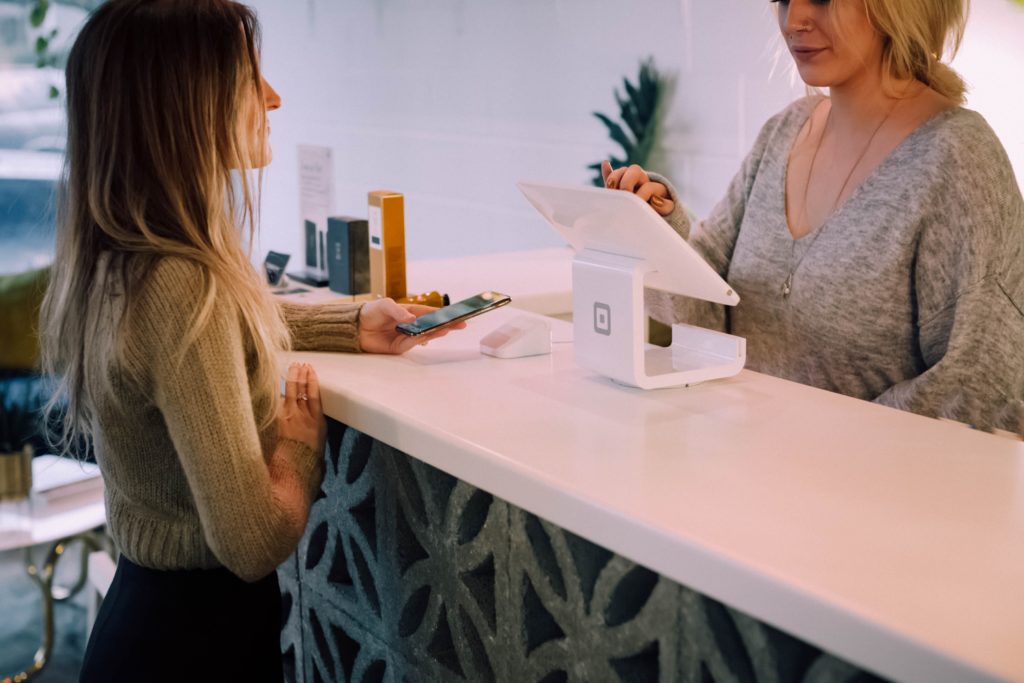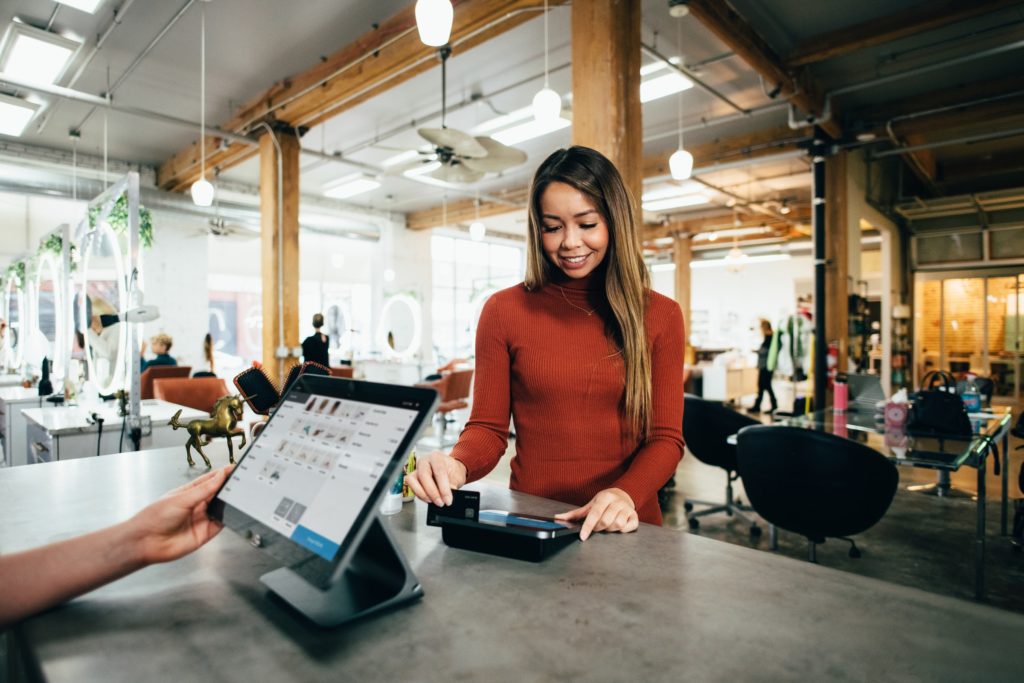Gravity Payments is Shaking Up the Payment Processing World for Small Businesses
When a small business owner decides to start their business or start accepting credit cards as a form of payment, they have a big decision to make. There are many different options and companies to choose from and every credit card processing company differs from the various fees, to equipment requirements, to how they integrate with your existing systems. Gravity Payments is working to make the entire process simpler for less.
A friend and colleague of Propel Businessworks, Tanya Williamson of Gravity Payments has had over 10 years of financial and consulting experience. As an Account Consultant for the well-known payment processing firm for over three years, Tanya has been helping Portland small business owners select the best in processing solutions.
In a recent interview with Tanya, we asked the following questions:
1. When choosing a credit card processing company, what are the questions a small business owner should be asking?
When choosing a payment processor, you always want to do your research. Make a list of the things that are most important to you like low rates, a local rep, a company that educates merchants on changes in the industry, a company that gives back to its community, fast deposits, a clear statement, reasonably priced equipment, etc. When you have a clear understanding of what you’re looking for it’ll be easier to recognize when you come across it.
Look up the processor’s BBB score, ask other businesses who they use and what they like and don’t like about their processor. Ask for business references from the payment processor you’re interested in. Go with your gut! If you feel uneasy about something or sense that you’re being pushed into something like a lease or into making a decision quickly than simply walk away. Do not move forward with a company that you are hesitant about – 9 times out of 10 your intuition is right.
2. What is the top business challenge you find when discussing payment processing options with companies?
I would say the top business challenge I find when discussing payment processing options with merchants is getting past the bad reputation the industry has. Most merchants are skeptical and weary of payment processors because they’ve been taken advantage of by one at some point. Payment processing is a very convoluted industry so lack of knowledge makes merchants standoffish…. It’s similar to a car repair shop, most customers think they’re being taken advantage of because they simply do not understand the details. Unfortunately, all the above is true.
I see unethical payment processors exploit merchants all of the time. Most payment processors pay their reps with commissions and bonuses so, to get paid, they’ll say whatever they need to say to the merchant to get them to switch, even if it’s a flat out lie. Overall, I totally get how merchants feel because it’s justified. The hard part is trying to explain to merchants that we’re different and that we genuinely care about what’s best for them. At Gravity Payments, we’re salary paid consultants, no commissions or bonuses. We have a low pressure consultative approach in working with businesses. We review the merchants current setup and see what savings and improvements we can offer. If anything, we may just confirm that what the merchant has in place is good and that there’s no reason for them to switch. Again, it’s all about what’s best for them, even if that doesn’t mean switching to Gravity.
3. How does Gravity payments differ from other business credit card processing platforms such as Square or Paypal?
Square and PayPal are both very different from Gravity Payments. Square has a one price (2.75%) fits all program. A flat rate of 2.75% is really good for merchants with an average ticket of $15 or less, this is why you see Square in a lot of coffee shops. Square is great for coffee shops, food trucks, and other small ticket merchants. When the average ticket is higher, let’s say $40, the rate of 2.75% is too high. The merchant should be paying far less than 2.75% at this point. Furthermore, Square has only one processing option for its merchants. You can’t use ShopKeep POS or LightSpeed or any other POS solution because Square does not integrate with any other POS solutions or terminals. They’re definitely limited in this area.
The other main difference with Square is that they have daily billing versus end of month billing which can be a reconciling nightmare. Most owners and bookkeepers prefer an end of month billing structure. The customer service offered with Square is very different from Gravity, as well. With Square, you can tweet or email questions, there is no customer support team or personal consultant. You lose the personal relationship aspect when working with Square. PayPal is very similar to Square except for the pricing is slightly lower at 2.70%.
At Gravity, we tailor our pricing to each individual merchant because each business is different. What works well for one merchant might not work well for another. We can process payments for merchants online, through their smart phone, or in their store. We also integrate with most all POS solutions and terminals out there so the merchant can choose the processing system that fits their needs. Furthermore, we have a 24/7 support department that merchants can call if they need help in any way.


4. Customers trust that their information is protected. What steps does Gravity Payments make to ensure that sensitive information is not leaked and that business owners don’t jeopardize their relationships with their valued customers?
At Gravity, we always make sure that the systems that are downloaded are up-to-date and compliant. We make sure that full credit card numbers are not being printed out on customer receipts or stored in the terminal. For those merchants processing over the internet, we discuss the extra security programs the merchant can sign up for to further protect customer information. We, also, discuss best practices that merchants can be following to ensure that sensitive information is not leaked.
5. The “EMV (Europay MasterCard Visa) fraud liability shift” is something business owners may not be completely familiar with. What is it and how will it affect small businesses?
EMV chip technology is the future of credit and debit card transactions. It was developed to help increase security, reduce fraud, and support value added applications. Moving forward, every customer’s card will be embedded with a microchip that stores and protects their data better than a magnetic strip. For every new sale, a customer’s chip card uses a new encryption code (called a token) making each and every transaction more secure. If you haven’t already received a chip card from your bank, you will soon.
In October, Visa, MasterCard, and American Express are shifting over card-present liability to whoever is the least EMV-compliant party in a fraudulent transaction. So, what this means is that if a fraudulent transaction were to happen at a merchant’s place of business after October 2015 and the merchant was not equipped with EMV technology but the customer did indeed have a chip card than the cost of fraud would fall back on the merchant. This goes the other way around as well, if the merchant was equipped with EMV technology but the customer did not have a chip card than the cost of fraud would fall back on the bank or card association.
Overall it’s a pretty simple concept but unfortunately a lot of unethical payment processors have used this information as a scare tactic to take advantage of merchants. I’ve seen other processors force merchants to buy new equipment that was not necessary at all. What merchants need to know is that their current terminals/systems are not illegal and they will not be fined for continuing to use what they have.
Furthermore, I’ve seen new technology equipment being sold for super high prices which is just a way for the payment processor to make more money. The new technology equipment is not very expensive. You can get an EMV terminal for as low as $250 so if the price you’re being quoted is $1,500 than consider that a red flag…


6. You recently shared a story on Facebook about a business owner that was taken advantage of by an unethical processor who set the company up with a terminal lease. In your words, it was an unnecessary lease. Can you elaborate on payment terminal leases and why they are unnecessary?
Never, never, never sign an equipment lease!!! I consider equipment leases one of the most unethical practices in our industry. The merchant always ends up paying far more for the terminal then needed and at the end of the lease they don’t even own the machine, they have to give it back! Sorry if I sound heated about this topic, I’ve just seen so many merchants taken advantage of in this way and it’s heartbreaking. The leases I typically see are for $50-$150 per month for 4 years. Let’s say a merchant leases a VX520 terminal, which is a new technology terminal with EMV, for 4 years at $100 per month. After the 4 years the merchant will have paid $4,800 for a terminal that cost around $325 to purchase. They will have wasted $4,475 and again, they don’t even own the terminal in the end. Some leasing companies even have a restocking fee of $150 for sending the terminal back at the end of the lease.
I have tried several times to get merchants out of leases and never once have I been successful. What normally happens is that the unethical payment processor gets the merchant to sign a lease which they sell to a third party leasing company so when you call the payment processor to complain about the lease they’ll say they can’t talk to you about it because they don’t service the lease. They’ll advise you to call the leasing company. So, you call the leasing company and try to change the terms or cancel the lease and then they tell you that the lease is unchangeable and unbreakable and that the lease was signed so there’s nothing they can do.
At Gravity, we sell terminals at a reasonable cost, $250 – $550 depending on the model. If you cannot purchase the equipment than you can rent it on a month-to-month basis. Rentals range from $15-$25 per month depending on the model. If you want to stop renting the terminal, you can simply give it back and the rental charges stop. Overall, you should not be working with a payment processor that offers leases.


7. What are the steps taken to integrate Gravity Payments to a website payment systems? (i.e. how does Gravity Payments match with certain web hosts & shopping carts)
Gravity Payments integrates with most all web hosts and shopping carts. The way we integrate is through a payment gateway. A payment gateway is an e-commerce application service that authorizes credit card payments for e-businesses and online retailers. It is the equivalent of a physical terminal located in brick and mortar retail businesses. Think of it as simply the hardware that the transactions processes through. There are several third party payment gateway providers, Authorize.Net being the most commonly used.
If a merchant is looking to process transactions online then they’ll want to work with a web developer to determine the best web host or shopping cart to work with. Once that’s decided then the web developer will be able to let the merchant know which payment gateways work with the shopping cart that was chosen. From there the merchant will choose a payment processor to integrate with the chosen payment gateway. There seems to be a lot of moving parts but really it’s pretty simple.
If you have questions for Tanya about Gravity Payments or the overall payment processing system, contact Tanya to see how she can help.
Get in touch with Tanya:




